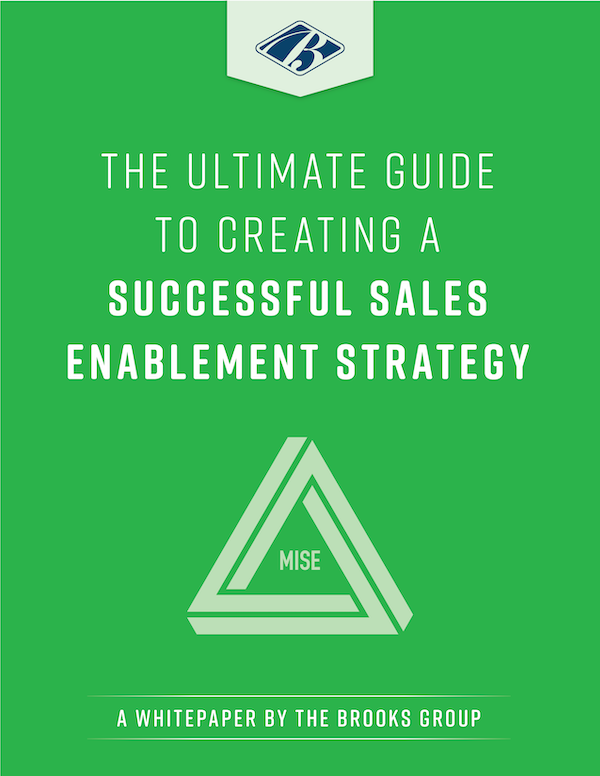In today’s marketplace, consultative selling is a critical differentiating factor. Competition is fierce. Buyers have endless options and information available at their fingertips. Having a good product or service is no longer enough to stand out.
To stay relevant and get ahead of the competition, your salespeople must be capable of selling your offering. But they also need to sell themselves as strategic advisors capable of helping solve their prospects’ and customers’ business problems.
Now, instead of focusing on transactional sales, salespeople must build long-term relationships beyond the initial sale and maintain their standing as trusted business partners.
A consultative sales approach is how they can to do that.
What Is a Consultative Sales Approach?
Consultative selling is a needs-based selling approach that focuses on building a relationship with a customer or prospect, understanding their problems, and developing solutions to their challenges. The primary skill is asking open-ended questions and active listening.
Consultative selling puts the buyer’s needs over the needs of the sales professional. Instead of leading with a sales pitch, sellers conduct conversations and provide insights, advice, and guidance that is helpful and non-manipulative, and that helps potential customers achieve their goals.
Here are the top seven consultative selling strategies you need to teach your sales team, so they can win more business, improve customer lifetime value, and increase share of wallet.
1. Research Prospects Thoroughly Before Engaging
In the fast-paced world of sales, sales professionals jump from one call to the next with minimal research. This is a mistake. First impressions matter and you want the customer’s first impression of your sales team to be one of competence, caring, and connection.
Thorough preliminary research ensures that your sales professionals can add value to the conversation by asking probing questions rather than wasting the prospect’s time with simple questions that are answered on their website.
Train salespeople to conduct a thorough investigation of the contact, their industry or business, and their organization. Have them use social media, company websites, and third-party news and research sites to gather as much information as they can, including the history of the individual and their company, as well as any current events affecting them.
The more the salesperson knows in advance, including recent news, the marketplace, the competition, and the particular problems they may be facing, the more thoroughly they can engage the client at a high level. This helps them win the respect and trust of the prospect. You want the buyer to view you as a resource rather than a product vendor.
Sellers should conduct research before every call or meeting so they stay up to date on current events affecting each prospect.
2. Engage in pre-call planning
Research is critical before each call and contact, but it is not enough by itself. Using the research, coach your team to invest time in the pre-call planning process. This includes identifying where the buyer is in their buying journey and any particular issues that may affect their buying readiness (such as a company or industry events). The process should also identify objectives for the call, and the specific skills and steps necessary to reach that objective.
The plan should include a list of consultative sales probing questions that the sales professional can use to uncover prospects’ needs and wants. Probing questions are usually open-ended questions that build trust, lead the prospect to uncover their own needs and wants, and help the seller understand how they can help the customer.
Download our What Works in Prospecting: Research-Backed Strategies for Filling the Sales Funnel white paper to learn more prospecting tactics your sales team.
3. Build Trust with the Prospect During the Call
Trust is a critical ingredient in consultative selling. A prospect who does not trust the sales professional will be less likely to answer questions, reveal problems, or cooperate with discovery and problem-solving.
The fastest way to lose trust is to treat the prospect like a wallet and focus only on what you can sell them. It’s critical that sales professionals address the prospect as a person, not just a decision-maker. They should focus on uncovering what makes the buyer tick, and why, so that they can provide effective consultation.
Invest in teaching sales professionals how to build rapport early in the relationship. Coach your sales team to express genuine interest, compassion, and commitment to the prospect’s success. Trust also requires sales professionals to follow through on promises. This starts with small things such as sending material when they say they will, to big things such as delivering the right solution. When a buyer can rely on a seller to follow through on small promises, it teaches them they can depend on them for the big things too.
4. Ask Great Follow-Up Questions
While it’s important to develop a list of questions during pre-call planning, it’s also important that your salespeople not simply rattle them off like a script. This can feel like an interrogation to the prospect and does not develop trust or engage them in a consultative sales approach.
Instead, equip your salespeople with the skills to ask good questions, listen actively and thoroughly to the answers, and to follow up with good, probing questions that dig deeper.
A consultative approach uses this more fluid conversational style to uncover pain points and begin identifying where and how you can help. A responsive line of questioning will uncover the challenges the contact is truly facing, which may be different from what the customer initially stated or the seller assumes.
Prospects open up to effective consultative selling because the conversation is authentic and unscripted. They begin to feel that the conversation has value apart from learning about your solution.
5. Actively Listen to Prospects
Some sales professionals ask questions as though they’re “supposed to.” While the prospect is answering, the seller focuses on what they’ll ask next rather than on what the prospect is currently saying.
This is human nature, and common in daily conversation. But world-class sales professionals do better. They shift their focus and make it their main objective to solve the prospect’s problem. That requires them to really listen to and understand the problem.
Coach your sales team to slow down, talk less, and hone in on the prospect. Active listening means asking follow-up questions that show you’re paying attention. We recommend a 3-deep question approach that helps sales professionals get to the root of an issue rather than viewing it at the surface level.
Using a 3-deep questioning strategy, the conversation with a prospect might go something like this:
Seller: So, you’re having delivery issues with your current supplier. How does that translate to your business?
Prospect: It’s delaying our delivery to hospitals and ambulance drivers who need and expect the products on time.
Seller: What impact does that have on your efficiency and bottom line?
Prospect: We spend a lot of time, energy, and money negotiating the returns and tracking down deliveries. It’s cutting into our profit margin substantially, not to mention it creates a ripple that ultimately affects patients.
Seller: What would it mean to you to have guaranteed quality products delivered on time?
Prospect: We really want to partner with a high-quality company that can deliver on time, every time. We spent over $5,000 last year alone on issues relating to returns.
6. Engage in Active Problem Solving
In the course of an effective consultative selling conversation, your sales professionals will either learn that a prospect is not a good match or that your offering can solve their problems.
Once trust is established and the conversation is going strong, teach your team members to focus in on those solvable issues. However, they shouldn’t go straight for the close, but instead use those problems to further their questioning and advising.
Teach them to work collaboratively with the prospect to brainstorm solutions and discover deeper needs. Help them uncover just how much those problems cost them and their organization. Lead them to understand how your offering can help.
Your sales professionals should work collaboratively with the prospect to understand what a successful solution will look like for them. They should be confident offering business advice. This means coaching your team to improve business acumen so they can provide solid, trustworthy consultation while simultaneously working toward a solution.
7. Adapt to Feedback
The most effective sales professionals constantly evaluate their consultative selling approach and adapt to feedback in real-time.
This requires sales professionals to be sensitive to the verbal and non-verbal cues of each prospect and to change their approach in real-time based on those cues. You can help them learn to do this effectively by introducing them to the concept of conversational styles, as understood through the DiSC profile system.
The DISC system provides a framework for understanding how people prefer to communicate and interact. Sales professionals trained in DISC communication styles can quickly identify which style each prospect prefers, and adapt their own communication and interactions to accommodate those preferences.
This works at a deep level to build and maintain trust and helps prospects be more open to your salesperson’s consultation.
Why Choose a Consultative Sales Training Program
The key to successful consultative selling is keeping a strong customer focus throughout the entire sales process. That focus creates a win-win situation where the buyer feels supported in having their challenge solved, and the seller gains a loyal, long-term customer.
IMPACT Selling® is a buyer-focused, consultative sales training process used by sales teams around the world, in many B2B industries. This consultative sales training program helps sellers connect with buyers and communicate the value of their product and services – solving challenges for the client while increasing sales revenue for the rep.
View the video below to see a client of The Brooks Group discuss her organization’s experience with IMPACT consultative sales training program, and how it enhanced their consultative sales approach.
Want to learn how our sales training programs can give your sales team an edge over the competition? Get in touch today.
The Ultimate Guide to Creating a Successful Sales Enablement Strategy
A successful sales enablement strategy requires intentional planning and direction from the top levels of an organization. Map out your strategy using this comprehensive training program guide and set your sales effectiveness initiative up for success.





